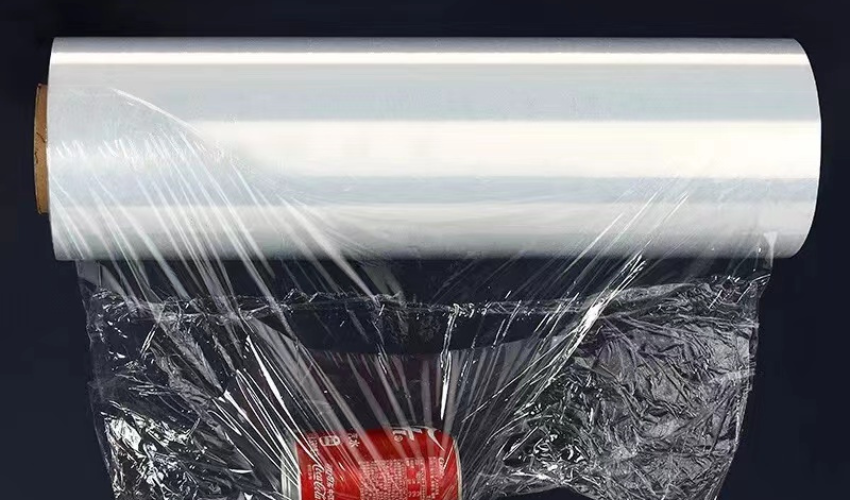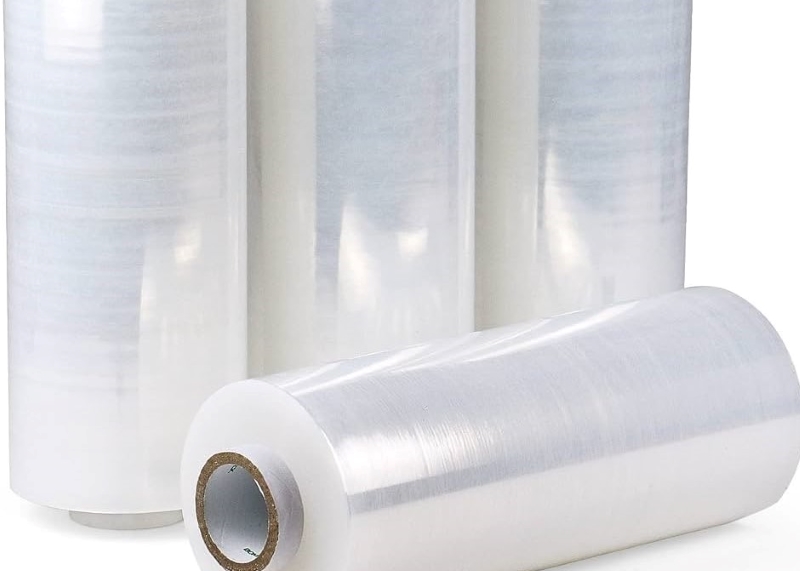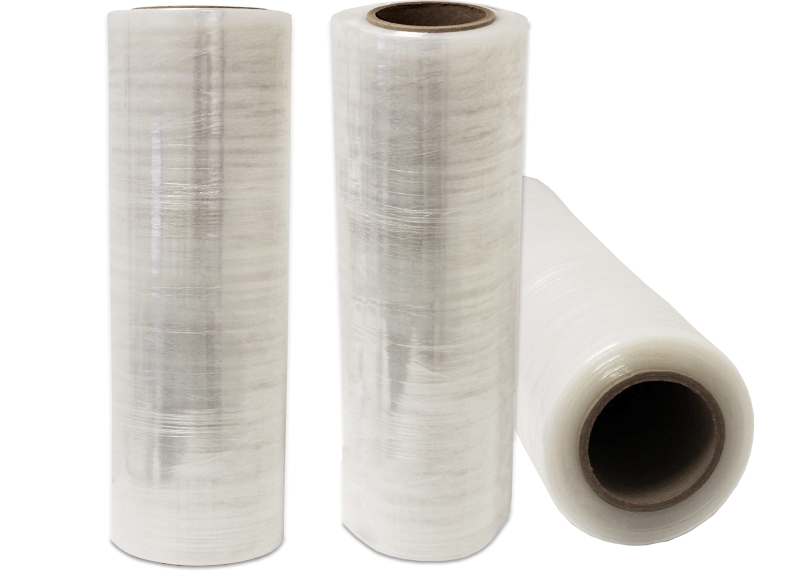
Cling wrap heavy duty offers an essential solution for various needs, providing an enhanced level of durability and strength compared to standard cling wraps. Known for its superior puncture resistance and strong sealing capabilities, cling wrap heavy duty is ideal for safeguarding food, furniture, and industrial items. It serves as a vital tool in food service by ensuring prolonged freshness and preventing contamination, making it suitable for commercial kitchens, catering, and packaging. In industrial and transportation settings, heavy duty cling film is invaluable for securing bulky items, protecting fragile goods, and stabilizing pallets during transit. Whether for food preservation or shielding items in storage and transit, cling wrap heavy duty delivers reliable protection, helping businesses and households maintain quality and safety. Cling wrap heavy duty is durable, puncture-resistant, breathable, and ideal for food storage, furniture handling, and industrial packaging.
Cling wrap heavy duty is a preferred choice across various industries and applications due to its impressive strength and versatility. From safeguarding perishable food items to securing heavy, irregularly shaped industrial loads, heavy duty cling film offers numerous benefits that make it indispensable in food service, logistics, and more.

One of the most prominent advantages of cling wrap heavy duty is its exceptional durability. This high-strength plastic wrap resists punctures, tears, and other types of damage, making it ideal for protecting large or awkwardly shaped items. Its heavy-duty composition ensures that wrapped items remain intact, whether they are in storage, in transit, or exposed to demanding conditions. Unlike standard plastic wraps, heavy duty cling film holds up against sharp edges, rough handling, and even extreme weather, which is especially valuable in industrial environments.
In the food industry, cling wrap heavy duty plays a crucial role in preserving the quality and freshness of perishable goods. Thanks to its superior sealing capabilities, this type of wrap locks in moisture and prevents exposure to contaminants, significantly extending the shelf life of food products. It’s particularly useful for commercial kitchens, where the freshness of ingredients and prepared dishes is essential. With heavy duty cling film, food items stay fresh longer, ensuring that quality is maintained for both storage and presentation.
Cling wrap heavy duty is known for its wide range of applications, proving valuable beyond just food storage. In industrial settings, it provides excellent protection for equipment, parts, and other items that need to be kept free from dust, moisture, and damage. Additionally, it’s effective for securing pallets, bundling items together, and stabilizing loads during shipping. Its versatility extends to uses like cling wrap for luggage, where it offers travelers a convenient way to protect bags from scratches, dirt, and tampering during transit. This adaptability makes it suitable across various environments, from warehouses and factories to kitchens and retail spaces.
Choosing the right cling wrap heavy duty depends on the specific requirements of each application. From food preservation in commercial kitchens to protecting furniture and securing industrial shipments, selecting the appropriate heavy-duty wrap ensures optimal durability, protection, and sealing.
For commercial kitchens, food storage, and preparation environments, heavy duty plastic wrap for food is essential. This type of cling wrap heavy duty provides superior adhesion and sealing capabilities, keeping food fresh and uncontaminated. It’s commonly used in restaurants, catering services, and food processing facilities, where maintaining food quality and hygiene is a top priority. Heavy duty plastic wrap for food also prevents moisture loss and seals tightly around containers, contributing to longer-lasting freshness and improved food safety.
Heavy duty plastic wrap is also an ideal choice for furniture protection. Whether during moving or storage, this wrap protects items from damage, moisture, dust, and scratches, ensuring that furniture remains in pristine condition. Large-sized cling wrap heavy duty or industrial-thickness plastic wraps are excellent options for securing oversized or uniquely shaped furniture, providing a strong layer of defense that maintains the integrity of valuable items.
When it comes to transporting commercial goods, heavy duty wrapping film is indispensable. This film stabilizes loads and prevents movement during transit, keeping products secure and reducing the likelihood of damage. In particular, bunding stretch film, a key type of heavy-duty wrapping film, is designed to handle more demanding applications, offering enhanced strength and stretchability to secure larger or heavier loads. Heavy duty wrapping film’waterproof and tear-resistant properties make it reliable in various weather conditions, providing a consistent barrier that protects items from potential damage. Heavy duty wrapping film is essential in shipping and logistics, where maintaining product safety during transit is critical.
Heavy duty plastic wrap for shipping offers a critical layer of protection, preventing contamination, wear, and tear on valuable or fragile goods. This wrap type reduces the risk of returns or refunds due to transit damage, making it particularly useful for packaging delicate, irregularly shaped, or high-value items. By securing items tightly, cling wrap heavy duty ensures that goods reach their destination in excellent condition, offering a reliable, secure solution for shipping needs.
Selecting the correct cling wrap heavy duty product, whether heavy duty shrink wrap or heavy duty wrapping film, depends on the specific needs of industrial and commercial applications. Both are built for strength, sealing, and stability, though they serve slightly different purposes.
Heavy duty shrink wrap and heavy duty wrapping film each play essential roles in safeguarding and stabilizing various loads. Heavy duty shrink wrap is ideal for large-scale projects that need secure, protective coverings with a tight seal. When heated, it conforms to the item’s shape, providing a customized fit that adds durability and resistance against elements. Heavy duty wrapping film, on the other hand, offers dependable security for moving, storage, and transit, preventing movement and damage to packed items.
| Product | Description | Key Uses |
|---|---|---|
| Heavy Duty Shrink Wrap | Provides a powerful seal when heated, perfect for larger, irregularly shaped items requiring tight protection | Ideal for oversized goods, construction projects, and outdoor storage |
| Heavy Duty Wrapping Film | Flexible, tear-resistant film that wraps securely around items, especially for transit and storage | Used to secure pallets, group items, and prevent movement during transport |
Heavy duty shrink wrap is especially suited for substantial projects, providing a resilient seal that can withstand harsh conditions. Once heated, it conforms closely to the shape of an object, forming a snug fit that locks out moisture, dust, and other contaminants. This heavy-duty option is often used in construction and large-scale industrial storage, where protecting the contents from external elements is essential. It’s also widely used in outdoor settings, as the shrink wrap remains securely in place even through extreme weather.
Heavy duty wrapping film is an excellent choice for securing items in transit or storage. Unlike shrink wrap, which requires heat to seal, heavy duty wrapping film relies on tension to tightly secure goods, providing stability and protection without additional equipment. Its tear-resistant and waterproof qualities make it ideal for maintaining load stability on pallets and bundling items together. Heavy duty wrapping film is particularly beneficial for logistics and warehousing, where it ensures that goods remain undamaged and intact during handling and transportation.
Both heavy duty shrink wrap and heavy duty wrapping film offer a range of practical benefits:
Cling wrap heavy duty offers specialized benefits across a range of industrial and commercial applications. Each type—industrial thick plastic wrap, commercial plastic wrap for food, and stretch wrap—provides unique advantages tailored to specific needs.

Selecting the right supplier for cling wrap heavy duty is crucial, whether you’re purchasing for personal use, business operations, or wholesale purposes. A reliable supplier ensures you receive high-quality products, competitive pricing, and consistent service. Below are detailed considerations to guide your decision.
Product Quality and Certifications
Evaluate the supplier’s product quality by requesting samples or checking customer reviews. Ensure the cling wrap meets your specific requirements, such as thickness, tensile strength, and breathability. For food-grade wraps, verify certifications like FDA approval or compliance with EU food safety standards. High-quality materials are critical for ensuring durability and safety in applications ranging from food storage to industrial packaging.
Supplier Reputation and Reliability
Research the supplier’s reputation in the market. Established suppliers with positive reviews and long-standing experience are more likely to provide reliable products and services. Check for testimonials, ratings, or case studies on their website or third-party platforms. A reputable supplier should have a track record of timely delivery, responsive customer support, and high customer satisfaction.
Customization Options
If you require cling wrap heavy duty for specific needs, such as unique dimensions, branding, or packaging, choose a supplier that offers customization. Custom solutions ensure the product aligns perfectly with your intended use, whether for retail or industrial purposes. Ask about minimum order quantities (MOQs) and additional costs for customization.
Pricing and Cost Efficiency
Compare pricing among different suppliers to ensure competitive rates. While low prices are appealing, they should not compromise quality. For wholesale purchases, inquire about bulk discounts, payment terms, and potential cost savings. Transparent pricing with no hidden fees indicates a trustworthy supplier.
Shipping and Delivery Services
Reliable logistics are essential, especially for bulk orders. Evaluate the supplier’s shipping policies, lead times, and handling of international orders if applicable. Opt for suppliers with efficient delivery networks and the ability to provide tracking information. Prompt and secure delivery prevents delays and ensures your operations run smoothly.
Sustainability Practices
If eco-friendliness is a priority, select suppliers offering biodegradable or recyclable cling wrap heavy duty. Inquire about their commitment to sustainability, including sourcing materials responsibly and reducing environmental impact. Suppliers with green practices can enhance your brand’s sustainability goals.
Customer Support and After-Sales Service
A supplier’s customer service is a key factor in building a long-term partnership. Assess their responsiveness to inquiries, willingness to provide assistance, and policies for handling returns or complaints. Reliable after-sales service ensures you can address any issues promptly.
Scalability and Long-Term Partnership
If you anticipate growing your business, choose a supplier capable of scaling production to meet increasing demands. Look for a partner who can support your long-term goals by offering consistent quality and flexible terms as your needs evolve.
Choosing the right cling wrap heavy duty supplier involves evaluating product quality, reputation, customization options, pricing, and logistics. A suitable supplier should align with your specific needs, offer transparent terms, and provide excellent customer service. By taking the time to assess these factors, you can build a reliable partnership that ensures consistent access to high-quality cling wrap heavy duty, whether for personal use, business operations, or wholesale distribution.
When purchasing cling wrap heavy duty, it’s essential to understand its features and choose a product that aligns with your specific needs, whether for food storage, furniture handling, or industrial applications. Making an informed decision ensures you achieve the best performance and safety while minimizing waste. Below are detailed precautions to guide your purchase.

Material Composition
Cling wrap heavy duty is typically made from either PVC (polyvinyl chloride) or LDPE (low-density polyethylene). PVC wraps are more stretchable and cling better to surfaces but may release plasticizers and chemicals, particularly when exposed to heat. LDPE, on the other hand, is considered safer for food storage and more environmentally friendly. If you need the wrap for industrial purposes, PVC might be preferred for its superior clinging ability, but for food-related use, prioritize LDPE to ensure safety.
Tensile Strength and Thickness
The durability of heavy-duty cling wrap is determined by its tensile strength and thickness. Ensure that the wrap can withstand stretching and resist tearing, especially if you plan to use it for industrial packaging or transporting goods. For applications involving sharp edges or heavy loads, look for reinforced or multi-layered wraps that offer enhanced puncture resistance.
Food-Safety Certification
If the cling wrap is intended for food storage, verify its food-safety certifications. Look for labels indicating compliance with FDA, EU, or other recognized food safety standards. This precaution helps you avoid potential chemical leaching that could harm your health, especially when storing acidic or oily foods.
Moisture Control Features
Some heavy-duty cling wraps are designed to be breathable, which prevents moisture accumulation under the film. This feature is crucial for storing fresh produce, as excess moisture can lead to mold or spoilage. Ensure that the product description highlights this feature if maintaining food freshness is a priority.
Size and Length of the Roll
Heavy-duty cling wraps come in various sizes and roll lengths. For industrial use, opt for wider rolls to cover large pallets or furniture efficiently. For home use, standard sizes are usually sufficient. Evaluate how much wrap you’ll need to avoid running out prematurely or wasting excess material.
Temperature Resistance
If you plan to use the cling wrap in extreme temperatures, such as for freezing or microwaving food, ensure that it is designed to handle these conditions. Some wraps are prone to melting or losing their effectiveness in high heat, while others may crack in freezing temperatures. Check the temperature specifications to ensure they meet your needs.
Eco-Friendliness
Consider the environmental impact of your purchase. Many heavy-duty cling wraps are non-biodegradable and contribute to plastic waste. If sustainability is a concern, look for products labeled as biodegradable, compostable, or recyclable. This ensures your choice aligns with environmentally conscious practices.
Buying the right cling wrap heavy duty involves more than simply picking the first roll on the shelf. By paying attention to factors like material composition, tensile strength, food safety, moisture control, size, temperature resistance, and eco-friendliness, you can choose a product that meets your needs effectively and responsibly. Taking these precautions ensures that you get the best value for your investment while safeguarding health, efficiency, and the environment.
When using cling wrap heavy duty, especially for industrial or large-scale applications, additional tools can enhance efficiency, precision, and safety. While not always necessary for household use, these tools are highly recommended for professional settings or frequent usage to save time and improve outcomes. Below is a detailed introduction to the tools that complement cling wrap heavy duty.
Cling Wrap Dispenser or Cutter
A cling wrap dispenser is a must-have for smooth and precise cutting. These dispensers often come with built-in serrated blades or sliding cutters, allowing you to easily cut the wrap to the desired length without tearing or crumpling. For heavy-duty applications, industrial dispensers made of metal or sturdy plastic can handle larger rolls and frequent use. A good dispenser ensures clean edges, reduces waste, and speeds up the wrapping process.
Stretch Wrap Handle or Roller
For wrapping large items like furniture or pallets, a stretch wrap handle or roller makes the task much easier. These handheld tools allow you to securely grip the roll and apply even tension as you wrap, ensuring a tight and secure seal. They also minimize strain on your hands and wrists, making them ideal for prolonged use or wrapping bulky objects.
Heat Gun or Shrink Wrap Machine
A heat gun or shrink wrap machine is essential if you’re using cling wrap heavy duty for shrink-wrapping applications. These tools use controlled heat to tighten the wrap around the item, creating a snug fit that protects goods during transport or storage. This is especially useful for industrial packaging, where stability and protection from dust, moisture, and damage are priorities.
Pallet Jack or Turntable
For industrial users wrapping pallets, a pallet jack or turntable can greatly simplify the process. A turntable allows the pallet to rotate as you apply the cling wrap, ensuring even coverage without having to walk around the pallet repeatedly. Combined with a stretch wrap dispenser, this tool increases efficiency and reduces effort in warehouse or shipping operations.
Protective Gloves
While not a tool for wrapping, protective gloves are important for handling heavy-duty cling wrap in industrial settings. They protect your hands from potential cuts caused by sharp edges or the serrated blades on dispensers. Choose gloves that offer a good grip to make handling the wrap easier.
Using these tools with cling wrap heavy duty ensures that the wrapping process is faster, neater, and more efficient. They help minimize material waste, prevent damage to the wrap, and improve safety, especially in professional or high-volume settings. Investing in these tools pays off by enhancing the overall user experience and ensuring optimal performance for various applications.
Heavy-duty cling wrap offers durability and superior sealing capabilities, but there are alternatives that are eco-friendlier and equally efficient. Beeswax wraps, silicone stretch lids, or glass containers with airtight lids provide reusable, sustainable solutions. Beeswax wraps, made from natural materials, are biodegradable and moldable, making them perfect for covering bowls or wrapping produce. Silicone stretch lids are durable, flexible, and come in various sizes to fit containers snugly. Glass containers with seals provide a completely airtight and reusable option, suitable for both storage and transportation. For industrial purposes, pallet wraps or stretch films designed for heavy-duty applications may outperform cling wrap by offering higher tensile strength and better resistance to tears. These options reduce waste, are often more cost-effective over time, and eliminate the single-use nature of traditional cling wrap, making them better choices for both heavy-duty and everyday use.
Heavy-duty cling wrap is significantly stronger than standard versions due to its enhanced tensile strength and resistance to punctures and tears. Typically made from low-density polyethylene (LDPE) or polyvinyl chloride (PVC), heavy-duty cling wrap can stretch without breaking, offering a robust seal for industrial and household applications. In industrial use, such as pallet wrapping, its strength ensures goods remain stable during transportation, withstanding moderate stress and environmental conditions. Laboratory tests often measure cling wrap’s durability in terms of its elongation at break (how far it can stretch before breaking) and tear resistance. While exact specifications depend on the brand and grade, heavy-duty cling wraps can support heavier weights and tolerate rough handling better than regular wraps. However, they are not invincible and can still tear under sharp edges or extreme force, so for very demanding applications, reinforced wraps or alternative materials might be required.
Cling wrap, including heavy-duty varieties, has several disadvantages. First, it’s generally made from plastic materials like PVC or LDPE, contributing to environmental pollution due to its non-biodegradability and limited recycling options. Second, cling wrap can release harmful chemicals, such as plasticizers, when exposed to heat, potentially contaminating food or other surfaces. This is especially concerning during microwave use. Third, while heavy-duty cling wrap is more robust, it still faces limitations in sealing certain surfaces, such as metal or very porous materials, reducing its effectiveness in some scenarios. Additionally, cling wrap’s single-use nature makes it less economical and environmentally sustainable compared to reusable alternatives like silicone lids or beeswax wraps. Lastly, improper disposal can lead to issues in waste management systems, including clogging machinery. These drawbacks highlight the need for more sustainable and versatile options for storage and sealing.
When seeking alternatives to heavy-duty cling wrap, consider reusable and sustainable options. Beeswax wraps are an excellent substitute, offering a biodegradable and flexible material that molds around containers or food items. Silicone stretch lids are another practical choice, providing durability and flexibility to fit over bowls or dishes securely. For more structured storage needs, glass or stainless-steel containers with airtight lids are perfect. In industrial settings, reinforced paper wraps, biodegradable films, or stretch netting may serve as eco-friendlier substitutes. Aluminum foil, while not reusable, is recyclable and can serve as a temporary replacement for specific applications. Waxed paper is another option for wrapping sandwiches or food items. These alternatives not only reduce plastic waste but also provide versatility and often better sealing properties, making them superior choices to cling wrap in many cases, particularly for those aiming to reduce environmental impact.
Cling wrap relies on static electricity and surface adhesion to stick to surfaces, but metal’s smooth, non-porous nature often reduces its ability to adhere effectively. Static electricity, a key mechanism in cling wrap’s stickiness, is less pronounced on metal because metals are excellent conductors that dissipate electric charges quickly. Additionally, heavy-duty cling wrap designed for industrial use often has a thicker composition, which may further reduce its ability to create a strong seal on non-porous materials like metal. The lack of surface roughness and moisture on metal surfaces can also diminish the effectiveness of the wrap’s grip. To improve adherence to metal, manufacturers sometimes add adhesive coatings, but for practical use, alternatives like aluminum foil or specialized sealing wraps designed for metal surfaces might be more suitable. Understanding these limitations ensures better performance when using cling wrap in various applications.

My name is James Thompson, and I’m the editor of this website dedicated to Stretch Film, Pallet Wrap, and Stretch Wrap products.
My passion for packaging began when I noticed the challenges companies face in securing their products efficiently for transportation and storage. This inspired me to delve deep into the world of stretch films and pallet wraps, exploring the latest technologies and best practices.
I aim to provide valuable insights, practical tips, and up-to-date industry trends to assist you in making informed decisions. Whether you’re a small business owner or part of a large corporation, my goal is to support you in optimizing your operations and ensuring your products reach their destination safely.
Thank you for visiting, and I look forward to accompanying you on your journey toward better packaging solutions.
Comments are closed